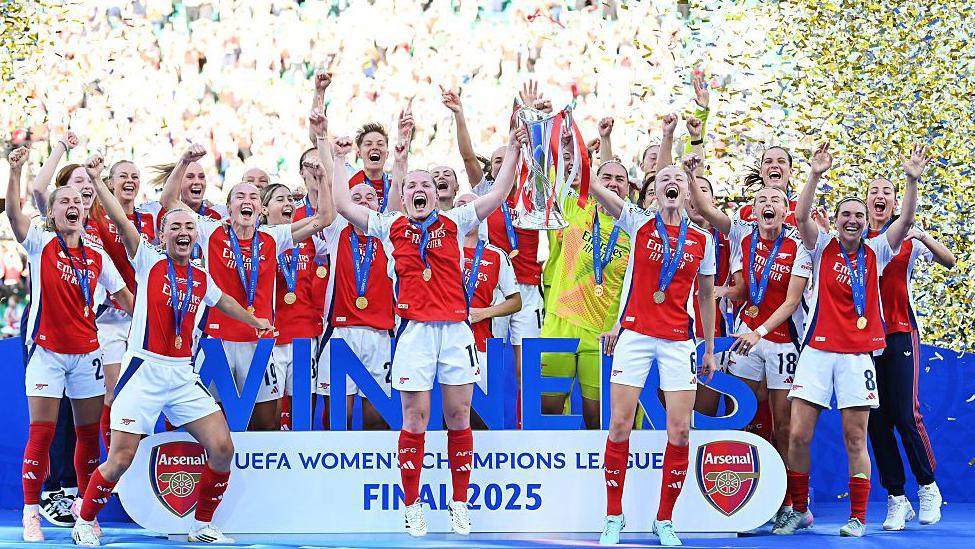WSL expanding to 14 teams - but relegation remains

London City Lionesses are the first independently-owned club in the WSL
- Published
The Women's Super League will expand from 12 to 14 teams from the 2026-27 season - but the threat of relegation will remain.
At the end of next season, the top two sides from the second tier, WSL 2, will automatically be promoted.
In addition, the third-placed team in the WSL 2 will face a play-off with the WSL's bottom side for a place in the top flight.
The plans were approved on Monday following a vote by clubs.
The announcement ends months of speculation about changes following suggestions in March that relegation could temporarily be scrapped in the WSL.
This notion prompted a backlash, but WSL bosses had always insisted no firm proposal on this had been put forward and they were simply weighing up the pros and cons of ways to increase the size of the league.
What's going on with falling WSL attendances?
- Published9 June
WSL revenues soared 34% during 2023-24 season
- Published9 June
A breakdown of the changes
The proposal was presented at a shareholders' meeting on Monday by WSL Football - the company that assumed control of the top two tiers from the Football Association (FA) in August 2024.
The FA will now meet to formally sign off the changes, which must be implemented before 31 July. This is seen as a formality following the clubs' votes.
Currently, only the WSL 2 winners earn promotion, with the bottom club in the WSL relegated - essentially one up and one down.
These are the changes that will take place next season to achieve expansion of the league:
WSL 2 champion - automatic promotion
WSL 2 runners-up - automatic promotion
WSL 2 third-place - play-off match
WSL bottom club - play-off match
However, that will change as the WSL expands from 12 teams to 14 teams for the 26-27 season. From then onwards, there will be one automatic promotion spot for the winner of WSL 2, with the bottom team in the WSL relegated.
In addition, there will be a play-off between second bottom of the WSL and runners up in WSL 2.
The FA will decide the next steps for the lower tiers.
It is expected the winners from the National League Premier Division North and the National League Premier Division South will gain automatic promotion into the WSL 2 next season.
The runners-up from those third-tier divisions would then take part in a play-off match for the final promotion spot in the second tier.
It is expected there will be two teams relegated from WSL 2 from 2026-27 onwards, and two automatic promotions from the third tiers.
All clubs must meet the licence criteria to play in the WSL 2 and the WSL.
Why do they want to expand the WSL?
Expansion is just the first step in WSL Football's 10-year plan.
Substantial changes have been made to the licence criteria to improve minimum standards as WSL Football aims for two fully-professional top tiers in England.
Requirements now include improved facilities, extra player contact hours, additional staffing and focus on club academies.
Analysis carried out by the body showed there were not enough games where the outcome had an effect on standings in the WSL. There is a belief that several clubs have stayed in the top flight for too long without threat of relegation and have not progressed as a result.
In the second tier, some clubs have elite standards, others have semi-professional environments and many have toyed between the two in the past decade.
However, with three WSL 2 clubs potentially earning promotion there may be more movement in the leagues going forward - and more incentive for clubs to invest.
What challenges does expansion face?

Arsenal won the Women's Champions League for a second time in 2025
Expanding the WSL means clubs will play 26 matches, not 22, from the 2026-27 season. But space in the calendar is already limited.
Schedule constraints include Fifa's Women's Club World Cup, a competition that will run every four years starting from 2028, the introduction of a Women's Champions Cup from 2026 and the expansion of the Women's World Cup to 48 teams from 2031.
In addition, Women's Champions League semi-finals take place on weekends - unlike in the men's game - and WSL matches are not played on the same weekend as the Women's FA Cup.
There are also guidelines around player welfare including a six-week break after a major tournament, a two-week winter break, a maximum of two midweek games in a row and no midweek games directly following an international break. This all reduces the available dates to play the additional games.
Plus WSL clubs must navigate fixture clashes with their male team counterparts in shared stadiums, as Arsenal experienced in November.
Discussions take place between governing bodies - Uefa, Fifa, the Premier League and the FA - but they often each have their own priorities.
Meanwhile, preferred kick-off times and broadcasting requests can cause discord among clubs.
There are plans to scrap the Saturday 18:45 evening slot on Sky Sports as average attendances at that time have been low across the WSL.
What is the Women's Champions Cup?
- Published3 October
What is the secret to Arsenal's WSL crowd success?
- Published10 June
What reaction might there be to changes?
The stringent licence revisions have caused backlash.
Blackburn Women withdrew from the WSL 2 after claiming the financial requirements "can no longer be sustained".
Third-tier club Wolves Women did not apply for a WSL 2 licence as owners were unwilling to move to a full-time model, as is required.
Barnsley Women, playing in the fourth tier, folded in June because of financial pressures, claiming "funding does not trickle down sufficiently".
Sources at WSL Football say it is working closely with National League clubs to raise minimum standards but the company is aware of short-term financial pressures.
There are also concerns WSL clubs will continue to build a bigger gap.
Chelsea's sale of their women's team to themselves - a move to navigate Profit and Sustainability Rules (PSR) - raised questions on whether more financial regulations should be put in place in the women's game.
The WSL currently has a "soft" salary cap, allowing clubs to spend up to 40% of their revenue on player salaries.
A stricter financial regulation has not been ruled out for the future but WSL Football is wary of stifling growth.
WSL Football chief executive Nikki Doucet says the "priority was to find a route that would benefit the whole women's game pyramid" and they hope these changes are the "next evolution" in professionalism.
She added: "We believe this will raise minimum standards, create distinction and incentivise investment across the board.
"The introduction of a promotion-relegation play-off creates distinction for the women's game and introduces a high-profile, high-stakes match."
WSL expansion is likely to be welcomed by clubs such as Birmingham City and Newcastle United, who have had an influx in investment recently.
Calls for the WSL to grow have existed for a number of years.
